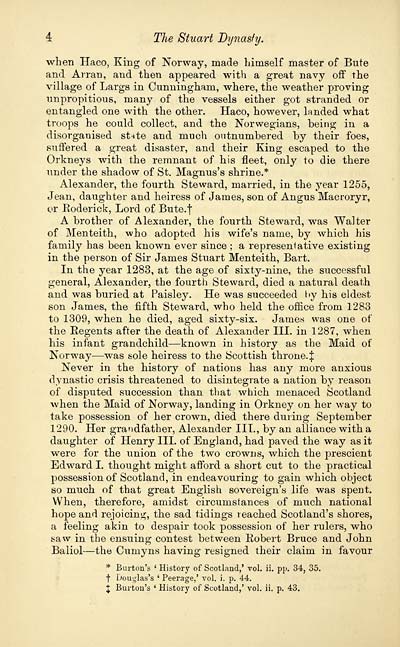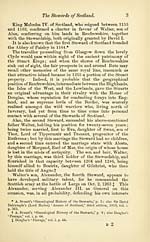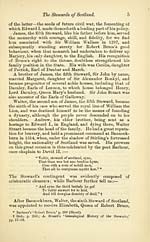Stuart dynasty
(24) Page 4
Download files
Complete book:
Individual page:
Thumbnail gallery: Grid view | List view

4 The Stuart Dynasty.
when Haco, King of Norway, made himself master of Bute
and Arrau, and then appeared with a great navy off the
village of Largs in Cunningham, where, the weather proving
unpropitious, many of the vessels either got stranded or
entangled one with the other. Haco, however, landed what
troops he could collect, and the Norwegians, being in a
disorganised state and much outnumbered by their foes,
suffered a great disaster, and their King escaped to the
Orkneys with the remnant of his fleet, only to die there
under the shadow of St. Magnus's shrine.*
Alexander, the fourth Steward, married, in the year 1255,
Jean, daughter and heiress of James, son of Angus Macroryr,
or Roderick, Lord of Bute.f
A brother of Alexander, the fourth Steward, was Walter
of Menteith, who adopted his wife's name, by which his
family has been known ever since ; a representative existing
in the person of Sir James Stuart Menteith, Bart.
In the year 1283, at the age of sixty-nine, the successful
general, Alexander, the fourth Steward, died a natural death
and was buried at Paisley. He was succeeded l>y his eldest
son James, the fifth Steward, who held the office from 1283
to 1309, when he died, aged sixty-six. James was one of
the Regents after the death of Alexander III. in 1287, when
his infant grandchild — known in history as the Maid of
Norway — was sole heiress to the Scottish throne.]:
Never in the history of nations has any more anxious
dynastic crisis threatened to disintegrate a nation by reason
of disputed succession than that which menaced Scotland
when the Maid of Norway, landing in Orkney on her way to
take possession of her crown, died there during September
1290. Her grandfather, Alexander III., by an alliance with a
daughter of Henry III. of England, had paved the way as it
were for the union of the two crowns, which the prescient
Edward I. thought might afford a short cut to the practical
possession of Scotland, in endeavouring to gain which object
so much of that great English sovereign's life was spent.
When, therefore, amidst circumstances of much national
hope and rejoicing, the sad tidings reached Scotland's shores,
a feeling akin to despair took possession of her rulers, who
saw in the ensuing contest between Robert Bruce and John
Baliol — the Cumyns having resigned their claim in favour
* Burton's ' History of Scotland,' vol. ii. pp. 34, 35.
f Douglas's ' Peerage,' vol. i. p. 44.
X Burton's ' History of Scotland,' vol. ii. p. 43.
when Haco, King of Norway, made himself master of Bute
and Arrau, and then appeared with a great navy off the
village of Largs in Cunningham, where, the weather proving
unpropitious, many of the vessels either got stranded or
entangled one with the other. Haco, however, landed what
troops he could collect, and the Norwegians, being in a
disorganised state and much outnumbered by their foes,
suffered a great disaster, and their King escaped to the
Orkneys with the remnant of his fleet, only to die there
under the shadow of St. Magnus's shrine.*
Alexander, the fourth Steward, married, in the year 1255,
Jean, daughter and heiress of James, son of Angus Macroryr,
or Roderick, Lord of Bute.f
A brother of Alexander, the fourth Steward, was Walter
of Menteith, who adopted his wife's name, by which his
family has been known ever since ; a representative existing
in the person of Sir James Stuart Menteith, Bart.
In the year 1283, at the age of sixty-nine, the successful
general, Alexander, the fourth Steward, died a natural death
and was buried at Paisley. He was succeeded l>y his eldest
son James, the fifth Steward, who held the office from 1283
to 1309, when he died, aged sixty-six. James was one of
the Regents after the death of Alexander III. in 1287, when
his infant grandchild — known in history as the Maid of
Norway — was sole heiress to the Scottish throne.]:
Never in the history of nations has any more anxious
dynastic crisis threatened to disintegrate a nation by reason
of disputed succession than that which menaced Scotland
when the Maid of Norway, landing in Orkney on her way to
take possession of her crown, died there during September
1290. Her grandfather, Alexander III., by an alliance with a
daughter of Henry III. of England, had paved the way as it
were for the union of the two crowns, which the prescient
Edward I. thought might afford a short cut to the practical
possession of Scotland, in endeavouring to gain which object
so much of that great English sovereign's life was spent.
When, therefore, amidst circumstances of much national
hope and rejoicing, the sad tidings reached Scotland's shores,
a feeling akin to despair took possession of her rulers, who
saw in the ensuing contest between Robert Bruce and John
Baliol — the Cumyns having resigned their claim in favour
* Burton's ' History of Scotland,' vol. ii. pp. 34, 35.
f Douglas's ' Peerage,' vol. i. p. 44.
X Burton's ' History of Scotland,' vol. ii. p. 43.
Set display mode to:
![]() Universal Viewer |
Universal Viewer | ![]() Mirador |
Large image | Transcription
Mirador |
Large image | Transcription
Images and transcriptions on this page, including medium image downloads, may be used under the Creative Commons Attribution 4.0 International Licence unless otherwise stated. ![]()
| Histories of Scottish families > Stuart dynasty > (24) Page 4 |
|---|
| Permanent URL | https://digital.nls.uk/94818054 |
|---|
| Description | A selection of almost 400 printed items relating to the history of Scottish families, mostly dating from the 19th and early 20th centuries. Includes memoirs, genealogies and clan histories, with a few produced by emigrant families. The earliest family history goes back to AD 916. |
|---|

